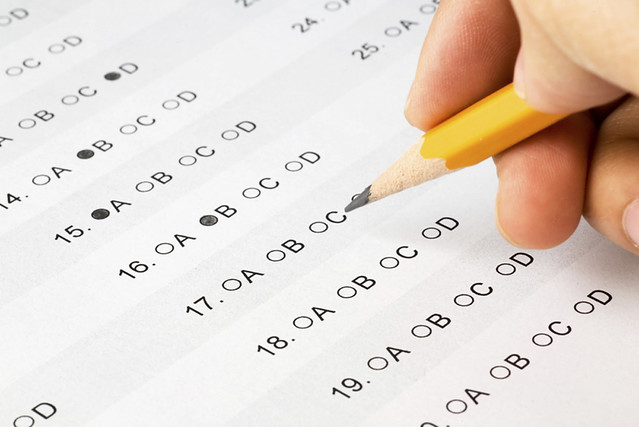 Today's piece in the Answer Sheet at the Washington Post is about an anti-testing alliance taking shape.
Today's piece in the Answer Sheet at the Washington Post is about an anti-testing alliance taking shape.Assessment experts say that standardized test scores are not a reliable or valid way to make high stakes decisions about the effectiveness of teachers or the achievement of students, but education policymakers have ignored these warnings for years. This has led to situations that are nothing short of preposterous, such as teachers being evaluated on the test scores of students they never had. Meanwhile, the emphasis on testing has led to an explosion of tests being given to kids; for example, fourth-graders in the Pittsburgh Public Schools have to take 33 standardized tests mandated by the district or state this school year. It is this reality that has fueled the resistance.I like the piece and I'm happy to see people continuing to question the proper role of testing, but there is something about it all that makes me uneasy.
This is an interesting issue, one that requires a bit of nuance, and the tag "anti-testing" is not exactly helpful.
Earlier this month I was listening to Asao B. Inoue talk about assessment and the writing classroom. The man has a lot to say on the issue, a lot of good stuff. He was saying that assessment should always come first; teachers should decide about what we are going to "measure" before planning a course. We need to know the destination we have in mind for our students; that is what should guide our teaching and planning. These ideas are particularly exciting when you learn that Professor Inoue puts a lot of stock in students' self-assessments.
Those ideas have influenced the way I teach and the way I design a course. And I firmly believe they should be steering the way we think about education.
And, no, I don't think standardized tests are helping move education in that direction.
But I would still resist the label "anti-testing."
Standardized tests are flawed instruments. I'll concede that, but so is every assessment measure available to educators.
It's time we fess up: Educators do not have a tool that allows us to see exactly what students know and understand.
But that doesn't mean we should pack up and go home.
That means we should keep working to better understand how learning happens and how to measure it.
Keep the tests, but don't treat them like a window into my students' brains.
Allow self-assessment into the process.
Allow peer-assessment into the process.
Allow external-assessment into the process.
Let's measure everything we can, and find new ways to measure things we can't.
We should not ask people to buy into a false choice of "You either like testing or hate it."
We should treat education like the complex process that it is.
3 comments:
Assessment does not necessarily mean testing, and should most definitely not be equated with standardized testing. What you describe in understanding the assessment first before planning the lessons is called Reverse Planning--Wiggins, I think, coined that, and it's critical that we do it that way. We use assessments ALL the time, informal, formal, summative, formative, authentic,and in some cases, uniform. These assessments are very informative--I can tell which of my students are understanding the material and which aren't, what I taught well, and what I didn't. The problem isn't assessments--it's the idea that you can create ONE assessment (one ring...) that trumps them all (to rule them all...), one test that is THE definitive test--an uber-summative assessment. This idea is what is ludicrous. Localized assessments (for lack of a better term) are good: comparing within a school, or if small enough, a district. But larger comparisons become apples and oranges. There is too much deviation in populations (just because numbers or types match up on paper, doesn't mean they do in the classroom), teacher delivery, and even text selection and lesson choices. How we teach influences how our students' test. So, this teacher is very anti-testing, but very pro-assessment. :)
Rob, are you saying that a standardized test is not a form of assessment? I agree that assessment does not equal testing.; assessment is an umbrella term under which testing falls. I'm not sure I agree, however, when you say assessment "should most definitely not be equated with standardized testing."
Standardized testing is just another assessment. It has holes, but it does provide us with information about students.
I think you and I see the big picture the same way. I also think local assessments should be given more credence - and when I say local, I mean like 'in the classroom' local.
But I don't want to see standardized tests go away. I just want to see us bring the stakes way down - way way down. The fate of schools or teachers certainly should not be put into the hands of test publishing companies. Nevertheless, a student's performance on a national or statewide test of baseline standards is informative. I'd hate to see those data go away because we overemphasized them for a decade or two.
That seems like we're allowing the pendulum to swing too far back.
Dang it...just wrote a long reply and it got erased. Oh well...short version: too many X factors for standardized tests to be useful. I learn nothing by comparing my students to students in LA, Denver, or Boston...makes no sense. Schools that look similar on paper (which is all that is used to create the comparisons) are not actually similar--all the way down to text books and which teachers choose to work there. I agree with 90% of what you say, just not that standardized tests are "another assessment" and are "informative," they really aren't. But, on another note, didn't you appreciate my LotR reference in the previous post? :)
Post a Comment